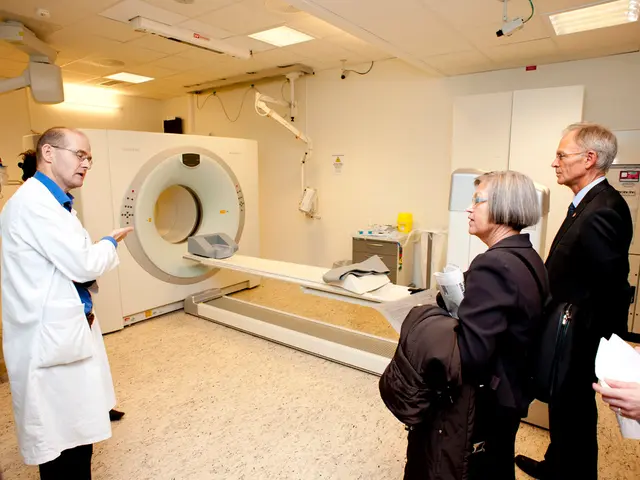Potential Mood Issues Later in Life Could Potentially Indicate Approaching Alzheimer's Disease
Late-life depression and bipolar disorder: More than just mental health issues?
Turns out, these late-onset mood disorders may not just be psychiatric conditions—they could be early warning signs of neurodegenerative diseases, such as dementia.
While the connection between these mood disorders and the onset of dementia has eluded scientists, a recent study led by Dr. Shin Kurose and Dr. Keisuke Takahata from the National Institutes for Quantum Science and Technology (QST), Japan, sheds some light on the matter.
Their research, published in Alzheimer's & Dementia: The Journal of the Alzheimer's Association, examined the presence of abnormal tau protein—a hallmark of several neurodegenerative diseases—in the brains of individuals with late-life depression and bipolar disorder.
Utilizing advanced brain imaging techniques and posterior tissue analysis, the researchers found that about 50% of participants with late-life mood disorders showed tau buildup in their brains, compared to just 15% of the healthy control group. Moreover, the researchers discovered that these abnormal proteins could be detected years before cognitive symptoms surfaced.
These findings suggest that tau-PET imaging might aid in detecting dementia in its earliest, non-cognitive stages.
The study is significant because it provides crucial insights that could impact clinical practice. Some cases of late-life depression and bipolar disorder might benefit from an evaluation for underlying neurodegenerative diseases, allowing for earlier intervention with disease-modifying treatments.
Additionally, the tracer molecules used in their PET scans could serve as effective biomarkers for detecting diverse tau-related pathologies in living patients, paving the way for further research and potentially better outcomes.
In summary, late-life depression and bipolar disorder may signal underlying neurodegenerative processes, offering a new avenue for early diagnosis and intervention in dementia and Alzheimer's disease.
About this mental health and Alzheimer's disease research news
Source: QTS
Contact: International Affairs and Public Relations Section - QTS
Abstract
Diverse tau pathologies in late-life mood disorders revealed by PET and autopsy assays
Enrichment Data:
The study found that around 50% of participants with late-life mood disorders showed significant tau protein accumulation in the brain, indicating neurodegeneration. Mood symptoms in these disorders often precede cognitive decline by an average of 7.3 years, indicating that mood changes could be the earliest indicators of upcoming neurodegenerative issues. Tau deposits were most prominent in areas associated with emotion and cognition, such as the frontal lobe. The study suggests that advanced imaging techniques, like tau-PET, could help detect dementia in its earliest stages, even before cognitive symptoms appear.
- The study at QST, Japan, focuses on late-life depression and bipolar disorder, potential early warning signs of neurodegenerative diseases like dementia.
- The research, published in Alzheimer's & Dementia, investigates abnormal tau protein presence in brains of those with late-life mood disorders.
- Advanced brain imaging techniques and posterior tissue analysis were utilized to detect tau buildup, revealing higher occurrences in participants with mood disorders.
- Comparatively, only 15% of healthy controls showed tau buildup, suggesting a significant correlation with mental health conditions.
- These abnormal proteins were found to be detectable years before cognitive symptoms emerge.
- This discovery suggests tau-PET imaging could aid in early detection of dementia in its non-cognitive stages.
- Earlier intervention with disease-modifying treatments could be possible for certain cases of late-life depression and bipolar disorder.
- The tracer molecules used in PET scans could function as effective biomarkers for various tau-related pathologies in living patients.
- Further research could lead to improved diagnostic methods and outcomes in neurodegenerative diseases.
- The findings emphasize the connection between mental health and Alzheimer's disease, opening a new avenue for early diagnosis and intervention.
- Neuroscience news regarding diverse tau pathologies in late-life mood disorders has significant implications for clinical practice in mental health and neurology.
- This study underscores the importance of timely detection of mental health conditions that may signal underlying neurodegenerative processes.
- Emerging neuroscience research could transform the understanding and management of various mental health conditions, including depression and mood disorders.
- The study's enrichment data reveals tau deposits were most prominent in areas related to emotion and cognition, such as the frontal lobe.
- In health and wellness, fitness, and exercise, nutrition, cardiovascular health, eye-health, hearing, digestive-health, respiratory-conditions, cancer, skin-care, and autoimmune-disorders, individuals should remain vigilant and seek help for any persistent mood changes, as they may serve as early indicators of upcoming neurodegenerative issues.








